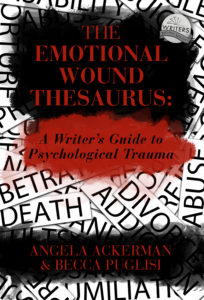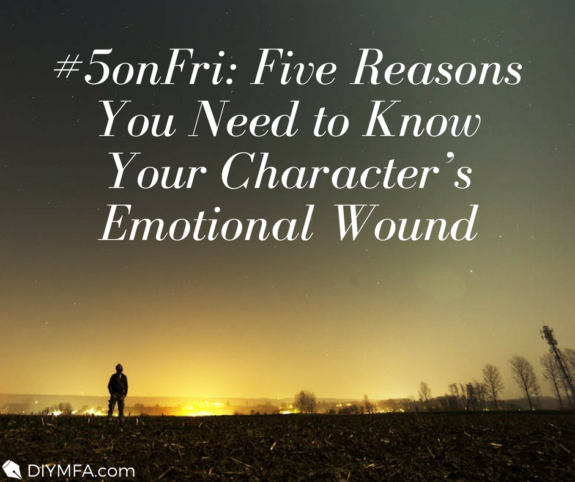As human beings, we’re all products of our past; good and bad, our experiences have formed us into who we are. The same should be true of our characters. One way to make them really believable and memorable is to dig into their backgrounds and unearth those defining moments so we’ll better understand how they became the people they will be in our stories. Positive experiences have impact, but today I want to talk about the importance of identifying your character’s primary negative experience—also known as the emotional wound.
A wounding experience is an event or series of events from the past that was so negative it caused the character deep psychological pain. Being neglected as a child, living with chronic pain, being falsely accused of a crime, experiencing the death of a son or daughter—these can be deeply hurtful and formative events that will have lasting impact on a character. To this end, let’s explore why you need to know your character’s wound.
1) It Will Spawn Her Greatest Fear
When a wounding experience happens, the memories and negative emotions associated with it are long lasting. The event is so awful that the character becomes afraid that it or something like it will happen again. This fear can take many different forms associated with the wounding event. A girl (we’ll call her Natalie) whose brother committed suicide might become terrified that someone else in her close circle might do the same thing. If she blames herself for not noticing the warning signs, her biggest fear might be that she will miss important clues in other peoples’ lives that could lead to devastating consequences. Or the sense of abandonment could be the part that hurts most, making her fear being deserted by others in the future. Wounding events always give birth to debilitating fears that cripple our characters and keep them from thriving. To know the fear and its effects, we must first identify the wounding event that generated it.
2) It Will Alter Her Personality
Fear is a huge motivator; we’ll do just about anything to avoid the things that scare us. As such, your character’s greatest fear will cause the formation of new positive and negative traits that are meant to protect him or her from repeating that painful experience. Let’s say Natalie’s fear is being abandoned again. She may become needy, clinging to those she loves out of a fear of losing them. On the flip side, she might become abrasive so she can drive people away before they get too close. Of course, positive changes can come out of a fear too. Natalie might become a very observant person because she doesn’t want to miss those clues again. She could become empathetic, nurturing, passionate, or independent. Many of a character’s dominant traits will stem directly from that negative past experience, so it’s important to figure out what that is.
3) It Will Change Her Behavior
Personality traits obviously determine the way we act. A grown-up, needy Natalie might develop new habits such as requiring constant reassurances of love from her spouse, prying into her friends’ private lives in order to stay connected, or using guilt to manipulate her children into spending time with her. Identifying the main wounding event from a character’s past will also show you her main personality traits, which will tell you how she’ll act and respond to various stimuli and circumstances, enabling you to write her consistently.
4) It Will Taint Her Beliefs About Herself and/or the World
When something awful happens, it’s human nature to examine it to try and make sense of it, to figure out why it happened and who is to blame. This often results in a skewed view of the world or ourselves. If Natalie blames herself for missing her brother’s cries for help, she may come to believe that she is someone who can’t be counted on. On the other hand, if she blames someone or something external, she can easily become jaded toward that thing; for instance, if her brother was seeing a therapist about his depression, she may decide that therapy is a sham that doesn’t do anyone any good. None of these ideas are true, but once Natalie begins to believe them, her behavior, her choices, even her morals will align with those beliefs. They’re all connected, and they all result from that formative experience in the character’s past.
5) It Will Impact Her Life on Every Level
Needy Natalie’s biggest fear is losing another loved one, but, ironically, she’s driving them away with her suffocating behavior. She often calls in sick at work so she can stay home in case her family needs her, and she’s close to losing her job. Her quality of life is stunted due to her constant anxiety and worrying. Every area of her life is being impacted by the aftershocks of the wounding experience.
T his is how readers find Natalie at the beginning of the story. They know virtually none of the details that have brought her to this point; it’s too early for that yet. But as each page is turned, the details will become clear, and as they’re revealed, it all clicks into place. That’s why she’s so clingy! No wonder she’s such a worrywart! Everything will make sense for the reader because the foundation has been laid.
his is how readers find Natalie at the beginning of the story. They know virtually none of the details that have brought her to this point; it’s too early for that yet. But as each page is turned, the details will become clear, and as they’re revealed, it all clicks into place. That’s why she’s so clingy! No wonder she’s such a worrywart! Everything will make sense for the reader because the foundation has been laid.
This is why it’s so important for every author to know their character’s wounding event. While it’s more work on the front end, it pays off in the form of higher reader satisfaction and a stronger empathy bond that can help build interest to carry them through to the very last page.
If you’re curious about this topic and would like to learn more, The Emotional Wound Thesaurus: A Writer’s Guide to Psychological Trauma covers over 100 possible traumatic experiences and how they can impact the character in the present. Armed with this unique resource, authors will be able to root their characters in reality by giving them an authentic wound that causes difficulties and prompts them to strive for inner growth to overcome it.
 Becca Puglisi is an international speaker, writing coach, and bestselling author of The Emotion Thesaurus and its sequels, including The Emotional Wound Thesaurus, which is now available. Her books are available in five languages, are sourced by US universities, and are used by novelists, screenwriters, editors, and psychologists around the world. She is passionate about learning and sharing her knowledge with others through her Writers Helping Writers blog and via One Stop For Writers—a powerhouse online library created to help writers elevate their storytelling. You can find Becca online at both of these spots, as well as on Facebook and Twitter.
Becca Puglisi is an international speaker, writing coach, and bestselling author of The Emotion Thesaurus and its sequels, including The Emotional Wound Thesaurus, which is now available. Her books are available in five languages, are sourced by US universities, and are used by novelists, screenwriters, editors, and psychologists around the world. She is passionate about learning and sharing her knowledge with others through her Writers Helping Writers blog and via One Stop For Writers—a powerhouse online library created to help writers elevate their storytelling. You can find Becca online at both of these spots, as well as on Facebook and Twitter.







